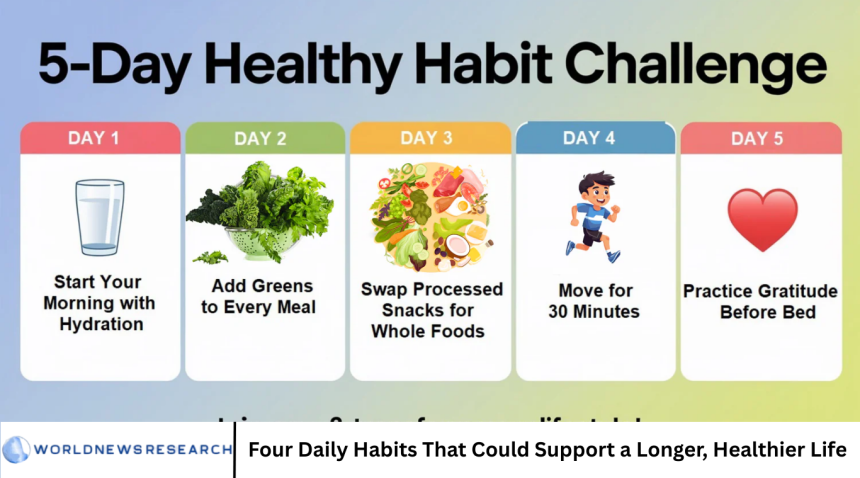Longevity isn’t a mere roll of the genetic dice—it’s deeply influenced by our daily choices. Research from centenarian studies around the world—from the Blue Zones to lifestyle medicine—consistently highlights core habits shared by those living into their 90s and beyond. This article explores four daily habits that are repeatedly linked to a longer, healthier lifespan. We’ll examine the scientific evidence behind each habit, offer actionable tips for integrating them into your routine, and close with FAQs to clarify common doubts.
Move Consistently—Not Just a Workout
Why Movement Matters
It’s not just about exercise—it’s about consistent, habitual movement. Regular physical activity supports cardiovascular health, maintains muscle mass, and supports metabolic balance. But the longevity secret is rooted in daily movement: walking, gardening, cleaning—habitually staying active without overexertion.
Evidence & Observations
Centenarians in Blue Zones naturally incorporate movement through daily tasks—walking to shops, tending gardens, doing household chores—without structured gym sessions. Studies show even moderate activity correlates with significant improvements in lifespan and quality of life.
How to Make It a Daily Habit
| Practical Tip | Description |
|---|---|
| Replace sit with stand or walk | Use walking meetings, short walks after meals, or stand while chatting |
| Do house or yard work daily | Routine chores keep you active without feeling like exercise |
| Walk or cycle for errands | Turn daily errands into movement opportunities |
| Incorporate balance challenges | Practice gentle balance exercises like heel-toe walks or Tai Chi |
| Take short breaks at work | Walk 5 minutes every hour to break long sitting sessions |
Eat Mostly Plants, Moderately & Mindfully
The Longevity Power of Plant-Based Nourishment
Centenarians tend to eat primarily plant-based diets rich in whole grains, legumes, vegetables, and nuts. Meat, when consumed, is usually in small portions as flavor, not staple.
Why This Works
Plants offer antioxidants, fiber, phytonutrients, and substances like polyphenols and healthy fats that reduce inflammation, support gut health, and help regulate metabolism.
Daily Strategies to Adopt This Habit
- Center meals around plants: let veggies and legumes be the core; include small portions of fish or lean meat occasionally.
- Practice portion control: small portions of richer foods help moderation.
- Choose whole foods over refined: such as whole grains over white flour.
- Be mindful of meals: eat slowly, savor, stop before full—promoting moderation and better digestion.
- Snack smartly: fresh fruit, nuts, or crunchy veggies instead of processed snacks.
Foster Social Connections and Community
The Longevity Impact of Togetherness
Strong social ties—family, friends, community—play a surprisingly potent role in long life. Longevity researchers consistently report communal engagement and positive relationships as common threads among centenarians.
How It Works
Community support helps reduce stress, provides emotional and practical care, and encourages healthy behavior—sharing nutritious meals or walking together.
Strategies to Build Connection Daily
- Make daily check-ins: phone calls, compliments, or chats with neighbors.
- Join local groups: walking clubs, faith groups, volunteering.
- Invite regular meals: cook for someone else or have meals together.
- Nurture intergenerational bonds: spend time with younger people or youth groups.
- Participate consistently: consistency helps cement connection that sustains health.
Manage Stress Through Purposeful Living
Why Mindful Purpose Matters
Having a sense of purpose, clear goals, and restful routines supports mental, emotional, and biological balance—key ingredients for longevity.
What the Science Shows
Purposeful living reduces stress, supports healthy sleep patterns, and encourages better lifestyle choices—all linked to longer, healthier life.
Practical Ways to Cultivate Purpose & Calm
- Start the day with a routine: journaling, stretching, planning goals gives clarity and calm.
- Take micro-breaks: even 5 minutes of breathwork or quiet helps reset stress.
- Engage in acts of purpose: volunteer, mentor, help someone—purpose elevates well-being.
- Reflect before bed: note what you’re grateful for and set a small intention for the next day.
- Limit screen time before sleep: cultivate evening rituals that add rest—not stress.
Bringing It All Together
These four habits—movement, plant-centered eating, social connection, and purpose/stress management—interact synergistically. Regular movement can be social; purposeful meals can be shared; mindfulness supports better eating and community building. The key is consistency and mindfulness, not perfection.
Frequently Asked Questions
Do I need to go to the gym every day to benefit?
No—consistent daily movement matters more than structured workouts. Intuitive activities like walking, chores, and gentle exercises are often enough to reap health benefits.
Can a mostly vegetarian diet meet my nutritional needs long-term?
Yes, if it’s well-balanced and includes legumes, whole grains, healthy fats, and varied produce. Occasional lean animal protein can fill nutrition gaps if desired—but it’s not necessary.
How do I build meaningful connections if I live alone?
Virtual meetups, local clubs, daily chats with neighbors, volunteer work, or participation in classes can all foster meaningful bonds—even without proximity.
How important is managing stress compared to physical habits?
Stress has powerful physiological effects that impact inflammation, sleep, and motivation. Purpose, rest, and daily calm work hand-in-hand with physical habits to support longevity.
Can making small changes really make a difference?
Absolutely. Small, consistent habits add up over years—leading to significant long-term benefits in mobility, metabolic health, mood, and resilience.
Where do I start if I’m overwhelmed?
Begin with one habit—like taking a daily walk. Build consistency first; then layer in mindful meal choices, social engagement, and mental rest routines over time.
Are these habits backed by solid research?
Yes, decades of population studies and aging research support the effectiveness of movement, plant-based diets, social integration, and purposeful living in promoting longer, healthier lives.
Conclusion
Longevity isn’t a mystery—it’s a mosaic of small, consistent habits built thoughtfully over time. By weaving in movement, mindful nutrition, social bonds, and a grounded sense of purpose, you’re not just surviving—you’re cultivating a life full of vitality, meaning, and years well-lived.If you’d like this adapted into shorter blog posts, social media shareables, or an infographic, just let me know—I’d be happy to help!






